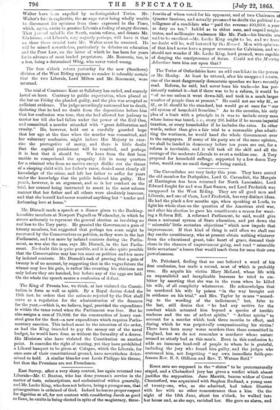The trial of Constance Kent at Salisbury has ended, and
scarcely lasted an hour. Contrary to public expectation, when placed at the bar on Friday she pleaded guilty, and the plea was accepted as sufficient evidence. The judge accordingly sentenced her to death, declaring that he had no doubt from the depositions before him that her confession was true, that she had allowed her jealousy to master her till she had fallen under the power of the Evil One, and committed a murder attended with " great deliberation and cruelty." He, however, held out a carefully guarded hope that her age at the time when the murder was committed, and her voluntary confession, might induce Her Majesty to exer- cise the prerogative of mercy, and there is little doubt that the capital punishment will be remitted, and perhaps it is best that it should be. We have from the first been unable to comprehend the sympathy felt in many quarters for a criminal who from no motive except dislike cut the throat of a sleeping child with her father's razor, denied most clearly all knowledge of the crime, and left her father to suffer for years under the knowledge that the public believed him guilty. Her youth, however, is an argument, and so is her conduct on the trial, her counsel being instructed to assert in the most solemn manner that her father and all others were absolutely innocent, and that she herself had never received anything but " tender and .forbearing love at home."






























 Previous page
Previous page